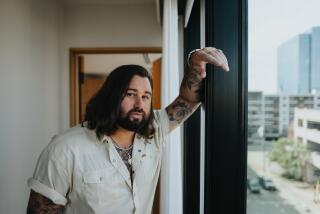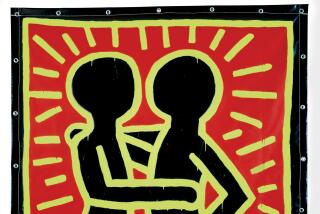OCTOBER SURPRISE
- Share via
Nashville — HERE’S how things were supposed to go when Keith Urban’s new album came out on Nov. 7: The handsome country star would be all over network TV promoting it, radio programmers would be hotly scanning it for hit singles, fans would be gobbling up copies and his record company would be toasting a breakout success.
And why not? Everything, it seemed, had been going so right lately for the New Zealand-born, Australia-reared musician, whose fervent wish until last week was to try out his new music for fans.
“A lot of the songs will be great to play live, especially in arenas where people sing along,” Urban said while putting finishing touches on the album at a recording studio here recently. “It’s like being in a stadium with soccer crowds where everybody is chanting. I love that so much.”
Now, the first thing everyone will be searching for in “Love, Pain and the whole crazy thing” will be clues -- clues to what might have driven Urban, 39, back into rehab nine days ago. This, the man who in just three years had gone from country wannabe to one of its brightest lights through a string of hit singles from two albums that have sold more than 3 million copies apiece.
Since making the jump from unknown opening act to concert headliner packing sports arenas, he’s widely been considered country’s leading contender for a mainstream pop breakthrough, both in the U.S. and internationally. Only four months ago, the country singer with a rock-star vibe married his home country’s biggest movie star, Nicole Kidman, putting what seemed like a fairy-tale coda to a life story peppered with struggle.
“All this seems so rolled up together to put Keith at the forefront of country music,” said Michael McCall, a writer-editor at the Country Music Hall of Fame and veteran music journalist. “He’s certainly one of the format’s biggest stars, and there’s no feeling that his career has crested at all or peaked yet.”
But less than two weeks before the album’s release date, Urban stunned fans and even some in his inner circle by checking into an unidentified rehabilitation treatment center, dredging up flashbacks to his decade-old battle with drugs and alcohol, one most people thought he had won.
So far, all Urban has said publicly is a short statement issued through a spokesman, then posted on his website. “I deeply regret the hurt this has caused Nicole and the ones that love and support me,” the statement said in part. “One can never let one’s guard down on recovery and I’m afraid that I have.”
Representatives at his record company, Capitol Nashville, and his management aren’t specifying what sent him back to rehab.
His manager, Gary Borman, said Urban’s goal is to address his dependency permanently.
“He’s a very strong guy, a very disciplined guy, and he thought he could do it on his own,” Borman said. “But nobody can, and that’s it.”
In his Oct. 20 announcement, Urban scrapped all public appearances for the immediate future. That included what was to be a featured performance Nov. 6 on the ABC telecast of the annual Country Music Assn. Awards show in Nashville. Gone too are several other high-profile network TV appearances. Plans for the record release are moving forward, but Urban’s absence from the picture leaves a big void.
“It’s huge,” said Capitol Nashville President Mike Dungan. “The biggest weapon in launching a record is the artist himself. We’re losing our performance on the CMA Awards, a performance at halftime for a major TV football game, the ‘Today’ show, ‘The Tonight Show.’ ”
In years past, heavy alcohol or drug use played a big part in the public image of some of the genre’s biggest stars, including Hank Williams, George Jones, Johnny Cash and Waylon Jennings.
Not anymore. “Stars are expected to be healthier, more fit and more presentable than they were 20 or 30 years ago,” McCall said. “Country music is very image-conscious today. People are expected to work really hard. It’s really hard to be drunk or strung out and do as much work as they have to do now.” At the same time, McCall added, “people recognize now that it’s a disease, and going for treatment can be seen as a positive thing.”
Dungan noted that many celebrities have bounced back from dependency struggles: “Kelsey Grammer had problems, Robin Williams had problems, and these were people in prime time with kid-friendly vehicles. I think people just expect there is a certain amount of this at any one time. You slip, you get into trouble, you get back up on your feet, and in the end, you’re still an artist, still an entertainer, still someone who communicates in a way the audience responds to.”
In fact, Urban’s fans have quickly rallied behind him. Postings to KeithUrbanFans.com and Country Music Television’s fan forum sites have been almost universally supportive.
“I am so proud of Keith for recognizing a problem, and getting himself into rehab,” read a post at the CMT website. “This is especially amazing to me as close as his album is to coming out. I hope he realizes that his life is more important than record sales.”
Snapshots of a life
A trip to rehab, however, guarantees that his new music will be viewed through a different prism. The new album’s first single, “Once in a Lifetime,” is a generally upbeat ode to undying love in which he imagines marrying the woman he cherishes, having children and growing old together. But there are signs that his fantasy isn’t fait accompli:
It’s a long shot baby
Yeah I know it’s true
But if anyone can make it
I’m bettin’ on me and you
The pressure was evident two months ago when Urban was in a Nashville recording studio wrapping up work on his hotly anticipated fourth album. Even though he was up to his pierced earlobes in mixing and editing chores, he was acting more like the proverbial kid in the candy store.
“I love this part of the process,” Urban said with a smile on a steamy, late-summer day, moving between two rooms to put finishing touches on songs in different stages of completion.
After calling it a day there, he chauffeured himself and his parents to co-producer Dann Huff’s house to listen to more mixes in Huff’s home studio. Then he was off to London for meetings with his label’s parent company, EMI Group, about developing his overseas following.
Urban took much of 2006 off from touring to spend time with Kidman, whom he met in Los Angeles early last year, and to work on the new album. But a heavy schedule of promotional duties had been looming, and he is slated for a world tour next year, one that Dungan, Borman and others are hopeful he will still do.
Urban expanded his audience considerably since becoming a major concert headliner last year. Initially, his rugged good looks and penchant for earnest songs of romantic devotion and commitment endeared him primarily to women. But when they dragged husbands and boyfriends along to his concerts, many men became fans on discovering him to be a dynamic performer, a skilled and expressive guitarist, a decent pianist and even a competent percussionist.
He plays all those roles on the new album, on which the rootsy tone of earlier efforts gives way in spots to an edgier classic-rock sound.
The expanded sonic palette grew out of two things: fan response during concerts and Urban and Huff’s penchant for experimentation.
“Part of exploring is being willing to go to places that totally suck,” Urban said in August. “There’s a courageousness in exploring. If nothing else, you end up back where you started. But at least you’re seeing it from a different place.”
Whether in the recording studio or on stage, Urban is doing the one thing he wanted to do from the time his parents bought him his first guitar as a child: make country music in Nashville, USA. On the family farm where he grew up outside Brisbane, Australia, he became enamored of American country music through his father’s record collection, dominated by such singers as Don Williams, Ronnie Milsap, Merle Haggard and Glen Campbell.
He got a record deal in Australia in his early 20s, scored several hits there, then moved to Nashville in 1992. He formed a country trio, the Ranch, that put out one album but quickly disbanded. His outlook and fortunes spiraling downward, Urban turned to alcohol and drugs, hitting bottom one night when he found himself crawling around the floor of a rented flat, soaked in sweat, searching for one more rock of cocaine.
He went through rehab, then started a steady rise through the country ranks after putting out his debut solo album, “Keith Urban,” in 1999. He talked openly about his drug and alcohol use for a time and has touched on that facet of his life in song on occasion, notably on his 2002 album, “Golden Road.” That album closed with “You’re Not My God,” a haunting portrait of a cokehead’s life.
For the most part, however, his life story provides more poignant subtext than revelatory content in his songs. His music is defined by catchy melodies and an often cheery, grateful attitude, in keeping with a new country school that largely avoids such perennial country music themes as drinking, cheating and lying.
Urban says his songs and albums constitute snapshots of his life at the moment he makes them, and some close to him think he may well turn to his latest life experience for inspiration down the line.
“I don’t think he’s let go of the introspection,” Borman says. “There’s still that struggle. There’s always a little element of doubt, and any of us who are honest with ourselves can identify with that. I think there’s a lot of that in him, and expressing that is part of the job of the artist who struggles to be honest.”
More to Read
The biggest entertainment stories
Get our big stories about Hollywood, film, television, music, arts, culture and more right in your inbox as soon as they publish.
You may occasionally receive promotional content from the Los Angeles Times.









